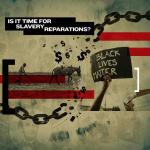Resentment vs Compassion.
PT 3203. Part 3: Russian Christian Nationalism
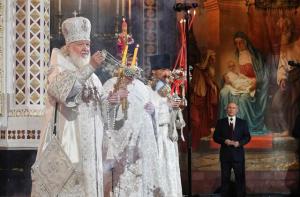
This post introduces the concept of Christian nationalism and then looks specifically at Russian Christian nationalism.
Nearly all of my progressive friends throw tantrums and stomp their feet when triumphantly denouncing “Christian nationalism.” I watch and listen with my head cocked like a curious dog, just wondering. I’ve never in my life met a Christian nationalist, at least that I know of. I’ve been wondering what the fuss is all about. Unable to interview a living Christian nationalist, I’ll have to research secondary sources to find out why my progressive friends are against Christian nationalism.
Is the matter of Christian nationalism urgent? Yes, indeed. I’ve asked one of my favorite public theologians, Sharon Delgado. She is alarmed. “Rather than fostering democracy, Christian nationalism promotes authoritarianism, and in some cases, fascism. A resurgence of Christian nationalism is taking place throughout the global church…In the 2016 election, the majority of white Christians voted for Donald Trump.” Yes, this is an urgent matter.
It is so urgent that Christians Against Christian Nationalism (CACN) has issued a Statement (well worth reading), which I’ve signed.
In what follows I’d like to engage in discourse clarification regarding Christian nationalism in two locations, one in Russia and the other in the United States. The Russian version of Christian nationalism is hierarchical, autocratic, and willing to go to war. The American version of Christian nationalism is ambient, diffuse, and locked in combat with countervailing forces. The American version provides us with a clear case of resentment. A certain class of American citizens resent what they perceive to be their future displacement and replacement by immigrants of different races, cultures, and religions.
At bottom, this is an existential crisis, at least for some segments of American society. Such resentment could become violent at worst. At least, it could dismantle the rational principles of democracy and squeeze out any compassion that a government might otherwise share.
White ‘n’ Woke Progressives Bashing Evangelicals
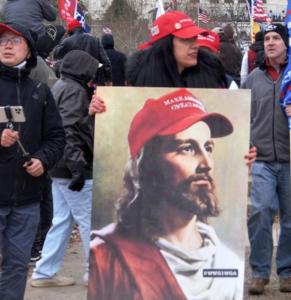
Now, American evangelicals roundly condemn Russia for its invastion of Ukraine. Evangelicals side with the victims of injustice and aggression. They do not support Christian nationalism in either Russia or the United States.
Even so, my white ‘n” woke progressive colleagues and friends confuse me about this.
One religious studies scholar and purported expert, Julie Ingersoll, redefines American evangelicalism to mean white Christian nationalism. Poof! Suddenly and magically we’re talking about a group so large that she can stoke our fears toward an overwhelming army of crazies at the gate: “The Threat of Christian Nationalism.”
Now, if we get fully riled up by anti-Christian nationalism rhetoric, we will rally our defenses against our former friends who are strict Calvinists, home-schooled as children, believers in scientific creationism, and such. “They teach theocracy,” announces Ingersoll in a rant against charismatic Christianity and the prosperity gospel. [Ingersoll is an expert on Christian Reconstructionism (Ingersoll, 2015)] [1][2][3]
What we’re seeing here, I think, is how the term, White American Christian Nationalism, becomes a mask to disguise progressive’s antipathy toward evangelicalism. If Christian nationalism did not exist, progressives might invent it for their own purposes.[4][5][6] Here’s Patheos progressive Matthew Distefano playing the Hitler card in “The Church Has Become a Monster.”
“This is why the church no longer has credibility. None. They’ve made their bed, probably with red MAGA sheets and a Trump flag blanket, and now they have to sleep in it. History won’t be too kind to these people, just like history wasn’t too kind to the German Christians who aligned with Hitler. And while I’m not saying that Trump is Hitler, I am saying that the same type of Christian Nationalistic spirit led to both. Both are toxic. Both are monstrous. And both are antithetical to the teachings of Jesus.”
If we ask evangelicals themselves, what do we learn? Here is an example. Os Guiness, a popular spokesperson in evangelical circles, is cited in another Patheos post: “For Christian reasons I have always appreciated George Orwell’s useful distinction between patriotism (positive) and nationalism (negative). Christian nationalism is therefore a form of idolatry and anathema for Christians.” Did he say, “idolatry”? Why didnt’ this evangelical endorse Christian nationalism?[6] Can you see why my progressive friends confuse me?
So, let’s set aside garden variety progressive antipathy toward evangelical Christianity for the moment. Let’s try to get at the phenomenon to which Christian nationalism might accurately apply. Is it a thing? Is it a church? Is it a doctrine? Is it an ideology? Let’s try to shine a little light on what is happening in our global social order.
In this post we’ll look at Russian Christian nationalism. In the next post, we’ll look at what’s happening in America.
Russian Christian Nationalism Today
With Russia’s invasions of Ukraine in 2014 and again in 2022, the world’s eyes have been drawn toward an unpredicted partnership in Moscow. It’s the bond between Vladimir Putin, President of Russia since 2012, and Kirill, born as Vladimir Mikhailovich Gundyayev, Patriarch of Moscow and All Rus’ since 2009. For the last decade, this Mutt ‘n’ Jeff team has been developing a “Mother Russia” type of ideology. It’s called, Ruskii Mir or Russian World. “Come home, all ye Russian speakers. Come home!”
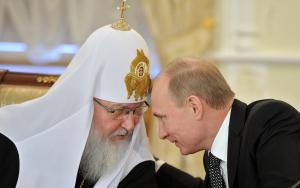
Russia’s invasion of Ukraine has both political and religious aims. Politically, Mother Russia wants Ukraine to return to the autochthonous womb. Religiously, Patriarch Kirill wants to subordinate the now autocephalous Orthodox Church of Ukraine to the Moscow patriarchate.
Here is a summary of Russia’s barely choate state theology–what we’re calling “Russian Christian nationalism” (source: Public Orthodoxy).
A DECLARATION ON THE “RUSSIAN WORLD” (RUSSKII MIR) TEACHING
“Putin and Patriarch Kirill have used Russian world ideology as a principal justification for the invasion. The teaching states that there is a transnational Russian sphere or civilization, called Holy Russia or Holy Rus’, which includes Russia, Ukraine and Belarus (and sometimes Moldova and Kazakhstan), as well as ethnic Russians and Russian-speaking people throughout the world. It holds that this “Russian world” has a common political centre (Moscow), a common spiritual centre (Kyiv as the “mother of all Rus’’), a common language (Russian), a common church (the Russian Orthodox Church, Moscow Patriarchate), and a common patriarch (the Patriarch of Moscow), who works in ‘symphony’ with a common president/national leader (Putin) to govern this Russian world, as well as upholding a common distinctive spirituality, morality, and culture.”
Now, Ruskii Mir is thought to be heresy by Orthodox Christians elsewhere in the world.
“Therefore, we reject the ‘Russian world’ heresy and the shameful actions of the Government of Russia in unleashing war against Ukraine which flows from this vile and indefensible teaching with the connivance of the Russian Orthodox Church, as profoundly un-Orthodox, un-Christian and against humanity, which is called to be “justified… illumined… and washed in the Name of our Lord Jesus Christ…”
So, most Orthodox Christians worldwide are opposed to Christian nationalism. Even if it’s contained in one country, Russia, Christian nationalism has justified unspeakable violence.
Even though Ruskii Mir sounds like gobbledegook, it has inspired and justified the wanton destruction of Ukraine’s infrastructure, the fleeing of refugees numbered in the millions, the deaths of civilians numbered in the thousands, the torturing and murdering of countless individuals and families. Like spraying Raid on an ant colony, Christian nationalism in Russia has proven to be a poison that leaves corpses strewn across the landscape.
In two of my Patheos posts–Moscow: The Worst Public Theology and Moscow Again: The Worst Public Theology–I employed discourse clarification to analyze Ruskii Mir. I felt confident that His Holiness Patriarch Kirill could be faulted for scapegoating the people of Ukraine and for stealing the symbol of the cross for political purposes. Regarding the latter, Kirill stole the redemptive power of Jesus’ cross and fenced it to the Russian soldiers, whose sacrificial blood redeems Mother Russia. What terms should we employ here? Heresy? Blasphemy?
After Russian Christian Nationalism, What’s Next?
“Blessed are the peacemakers, for they will be called children of God,” Jesus tells us in the Sermon on the Mount (Matthew 5:9). Living the life of beatitude does not seem to be the first thing on Patriarch Kirill’s mind. I simply cannot fathom how in good conscience the patriarch can wash the blood shed by Ukrainian people off the hands of Russian soldiers by turning them into little Christs!
Karl Rahner warns us to treat ideology gingerly. “The life of a Christian is characterized by a pessimistic realism and by the renunciation of any kind of ideology in the name of Christianity” (Rahner 1978, 403).
This post in the Resentment vs Compassion series is PT 3203. Part 3: Russian Christian Nationalism
Here’s what we’ve done so far and what to expect.
Resentment vs Compassion. Part 1: From Resentment to Ressentiment
Resentment vs Compassion Part 2: From Ressentiment to Reparations
Resentment vs Compassion Part 3: Russian Christian Nationalism
Resentment vs Compassion Part 4: American Christian Nationalism
Resentment vs Compassion. Part 5:” Ressentiment in the White ‘n’ Woke Unhappy Consciousness
Resentment vs Compassion. Part 6: Ressentiment with Copmpassion
Resentment vs Compassion Part 7: Christian Natiionalism’s Decline Narrative
Resentment vs Compassion Part 8: The Unhappy Consciousness Narrative
Resentment vs Compassion Part 9: To Slay the Christian Nationalist Dragon
Resentment vs Compassion Part 10: Don’t trust your pastor
Resentment vs Compassion Part 11: Christian Nationalism vs Anti-Christian Nationalism
Resentment vs Compassion Part 12:. A More Compassionate America? Trump Tyranny.
Resentment vs Compassion Part 13: Christian Nationalism versus the Vermin Curse
Resentment vs Compassion Part 14. Does Anti-White Christian Nationalism Scapegoat Evangelicals?
Resentment vs Compassion Part 15. Evangelicals Against Christian Nationalism
What’s next? In Resentment vs Compassion Part 4, we will turn to Christian nationalism on the American scene. It will look very different from what we have witnessed in Russia. Get ready to click.
▓
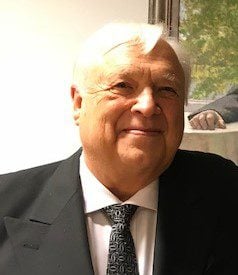
Ted Peters pursues Public Theology at the intersection of science, religion, ethics, and public policy. Peters is an emeritus professor at the Graduate Theological Union, where he co-edits the journal, Theology and Science, on behalf of the Center for Theology and the Natural Sciences, in Berkeley, California, USA. His book, God in Cosmic History, traces the rise of the Axial religions 2500 years ago. He previously authored Playing God? Genetic Determinism and Human Freedom? (Routledge, 2nd ed., 2002) as well as Science, Theology, and Ethics (Ashgate 2003). He is editor of AI and IA: Utopia or Extinction? (ATF 2019). Along with Arvin Gouw and Brian Patrick Green, he co-edited the new book, Religious Transhumanism and Its Critics hot off the press (Roman and Littlefield/Lexington, 2022). Soon he will publish The Voice of Christian Public Theology (ATF 2022). See his website: TedsTimelyTake.com. His fictional spy thriller, Cyrus Twelve, follows the twists and turns of a transhumanist plot.
▓
Notes
[1] To affirm that the United States is a Christian nation seems to be one of the tenets of Christian nationalism. We find this tenet advocated by David Barton’s organization, Wallbuilders. The Texas Freedom Network describes Barton as “fringe.” Christina Littlefield is also critical. “Beyond promoting false information, Barton ignores all evidence that illustrates the secular roots of the nation, erasing all complexity. ”[2] Rick Green’s Patriot Academy teaches a biblically based contortionism.
[3] What has just happened is that progressive anti-Christian nationalists have enlarged their enemy from a small group who self-identify themselves as Christian nationalists to an enormous group, evangelicals, who deny that they are Christian nationalists. Might there be a problem with this move? According to Benjamin Radford, there are “dangers of denouncing an entire group (be it a gender, a religion, or a political party) based on the worst examples of it. Not only does it magnify any given problem, but it also makes assigning responsibility impossible” (Radford, 2022, p. 98). One progressive Patheos blogger, Daniel Henderson, admits that we must distingusih between Chrstian nationalists, on the one hand, and evangelicals, on the other hand. Henderson then proceeds to spell out the 10 Commandments of Christian nationalist belief.
[4] What does Franklin Graham, son of Billy Graham, think? On the one hand, “Our country is not a Christian country, never has been. We have some Christian principles, but we’re not a Christian country.” On the other hand, “Can you imagine what a difference it would make if Christians ran for every office at all levels across our country – city council, school board, Mayor? We need to get involved and take a stand for biblical values and morals before it’s too late.” Franklin Graham told a reporter that “Christian nationalism doesn’t exist.” Yet, in a Patheos post, “The Dangers of Christian Nationalism,” Progressive blogger Keith Giles hints that Graham belongs to the Christian nationalist club. Just what is going on here?
[45 The prow of the American Evangelical journalistic ship is the magazine, Christianity Today, now CT for short, founded in 1956. If what our progressive anti-evangelical friends say is true–that evangelicalism is hopelessly lost to Christian nationalism–then, what would we expect? We would expect CT to come out with a strong endorsement of Christian nationalism. But, nothing like that happens. What CT in fact touts is a strong stand against Christian Nationalism. Here is Paul D. Miller in “What is Christian Nationalism?” He writes, “Christian nationalism tends to treat other Americans as second-class citizens. If it were fully implemented, it would not respect the full religious liberty of all Americans.” Again, what is going on here?
[6] Evangelical Patheos blogger George Yancy complains that the term, Christian nationalism, is so poorly defined as to be un-academic. “We need to resist the urge to make Christian nationalism a catchall term for whatever current criticism we have of conservative Christians.”
[7] Evangelical Patheos blogger Jackson Wu opposes Christian nationalism because Christian nationalism forges rigid categories of “us” versus “them.” As I browsed through my Patheos confrere bloggers–Roger E. Olson, Chris Gehrz, Melissa Borja, Nathan Rinne, Joao Chaves, Jim Denison, Shan Norwood, and others–I could not find a single evangelical who embraces Christian nationalism. What is going on here?
References
Butler, Anthea, 2021. White Evangelical Racism. Chapel Hill NC: University of North Carolina Press.
Ingersoll, Julie, 2015. Building God’s Kingdom: Inside the World of Christian Reconstruction. Oxford: Oxford University Press.
Radford, Benjamin, 2022. America the Fearful. Jefferson NC: McFarland.
Rahner, Karl, 1978. Foundations of the Christian Faith. New York: Seabury.



